- Home
- Tim LaHaye
Tribulation Force Page 12
Tribulation Force Read online
Page 12
Rayford held up the paper. “Earl, you’re a better detective than this.”
“What do you mean?”
“This smells.”
“You don’t think it’s legit?”
“First of all, my guy had a two-syllable last name on his ID badge. And when was the last time you remember an examiner having a secretary?”
Earl made a face. “Good call.”
“Speaking of calls,” Rayford said, “I’d like to know where that call came from. How hard would that be to determine?”
“Not hard. Francine! Call security for me, please.”
“Would you mind asking her to check something else for me?” Rayford said. “Ask her to call Personnel and see if we have a Jim Long or a Jean Garfield working for Pan-Con.”
“If you do not mind,” Carpathia said, “I would now like to ask your friends to join us.”
Now, already? Buck wondered. Just in time for the big news, whatever it is?
“This is your show,” Buck said, surprised at Carpathia’s pained expression. “Your meeting, I mean. Sure, invite them in.”
Buck didn’t know whether it was just his imagination, but it seemed both Steve Plank and Chaim Rosenzweig had bemused, knowing looks when they entered, trailed by Hattie. She set a chair from the conference table on the other side of Buck, and the men sat. Hattie left again. “Mr. Williams has a prerequisite,” Carpathia announced, to the low murmur from Plank and Rosenzweig. “He must be headquartered in Chicago.”
“That just helps narrow it down,” Dr. Rosenzweig said. “Does it not?”
“It does indeed,” Carpathia said. Buck glanced at Plank, who was nodding. The secretary-general turned toward Buck. “Here is my offer: You become president and publisher of the Chicago Tribune, which I shall acquire from the Wrigley family within the next two months. I will rename it The Midwest Tribune and publish it under the auspices of Global Community Enterprises. The headquarters will remain Tribune Tower in Chicago. Along with your job comes a limousine with driver, a personal valet, whatever staff you deem necessary, a home on the North Shore with domestic help, and a retreat home on Lake Geneva in southern Wisconsin. Beyond naming the publication and the publishing company, I will not intrude on your decision making. You will have complete freedom to run the paper any way you wish.” His voice took a tone of sarcasm. “With your twin towers of truth and justice undergirding every word.”
Buck wanted to laugh aloud. It didn’t surprise him that Carpathia could afford such a purchase, but there was no way a man so visible could hide behind a publishing company name and break every rule of journalistic ethics by owning a major media outlet while serving as secretary-general of the United Nations.
“You’ll never get away with it,” Buck said. He kept silent about the real issue: that Carpathia would never give anyone in his charge complete freedom unless he believed he had total control of their mind.
“That will be my problem,” Carpathia said.
“But with complete freedom,” Buck said, “I would be your problem too. I am devoted to the tenet that the public has a right to know. So the first investigative piece I assign, or write myself, would be about ownership of the publication.”
“I would welcome the publicity,” Carpathia said. “What would be wrong with the United Nations owning a paper dedicated to news of the global community?”
“You wouldn’t own it personally?”
“That is semantics. If it would be more appropriate for the U.N. to own it than for me, I would donate the money, or buy it and donate the company to the U.N.”
“But then the Tribune becomes a house organ, an in-house sheet promoting the interests of the U.N.”
“Which makes it legal.”
“But which also makes it impotent as an independent news voice.”
“That will be up to you.”
“Are you serious? You would allow your own publication to criticize you? To take issue with the United Nations?”
“I welcome the accountability. My motives are pure, my goals are peaceful, and my audience is global.”
Buck turned in frustration to Steve Plank, knowing full well that Steve was one who had already proven susceptible to Carpathia’s power. “Steve, you’re his media adviser! Tell him there’s no credibility in such a venture! It would not be taken seriously.”
“It wouldn’t be taken seriously at first by other news media, Buck,” Steve acknowledged. “But it won’t be long before Global Community Publishing owns those media services too.”
“So by monopolizing the publishing industry, you eliminate the competition and the public doesn’t know the difference?”
Carpathia nodded. “That is one way to phrase it. And if my motives were anything but ideal, I would have a problem with it too. But what is wrong with controlling global news when we are headed toward peace and harmony and unity?”
“Where is the power to think for oneself?” Buck asked. “Where is the forum for diverse ideas? What happens to the court of public opinion?”
“The court of public opinion,” Steve said, “is calling for more of what the secretary-general has to offer.”
Buck was defeated, and he knew it. He couldn’t expect Chaim Rosenzweig to understand the ethics of journalism, but when a veteran like Steve Plank could support a puff sheet for a benevolent dictator, what hope was there?
“I can’t imagine being involved in such a venture,” Buck said.
“I love this man!” Carpathia exulted, and Plank and Rosenzweig smiled and nodded. “Think about it. Mull it over. Somehow I will make it legal enough to be acceptable even to you, and then I will not take no for an answer. I want the paper, and I am going to get it. I want you to run it, and I am going to get you. Freedom, Buck Williams. Total freedom. The day you believe I am intruding, you may quit with full pay.”
Having thanked Earl Halliday for his confidence and promising not to declare himself just yet—though Rayford could not imagine taking the job—he stood in the terminal at an otherwise deserted bank of pay phones. Francine, Earl’s secretary, had confirmed that there was no Jean Garfield working for Pan-Con. And while there were no fewer than six James Longs, four of them were baggage handlers and the other two were midlevel bureaucrats. None worked in Dallas, none was an examiner, and none had a secretary.
“Who’s out to get you?” Earl had asked.
“I can’t imagine.”
Francine reported that the call she took that morning had been traced to New York. “It’ll take them a few hours to get an exact phone number,” she said, but Rayford knew in a flash who it was. He couldn’t be sure why she would do it, but only Hattie Durham would pull a stunt like that. Only she would have access to Pan-Con people who would know where he was and what he was doing that morning. And what was that business about Air Force One?
He called information and got the number for the United Nations. After reaching the switchboard and then the administrative offices, he finally got Hattie, the fourth person to pick up the phone.
“Rayford Steele here,” he said flatly.
“Oh, hi, Captain Steele!” The brightness in her voice made him cringe.
“I give up,” Rayford said. “Whatever you’re doing, you win.”
“I don’t follow.”
“C’mon, Hattie, don’t play dumb.”
“Oh! My note! I just thought it was funny, because I was talking to a friend in Pan-Con traffic the other day, and she mentioned that my old friend was recerting on the 777 this morning in Dallas. Wasn’t it funny that I had mail waiting for you? Wasn’t that just the funniest?”
“Yeah, hilarious. What does it mean?”
“The message? Oh, nothing. Surely you knew that, right? Everybody knows the new Air Force One is going to be a ’seventy-seven, don’t they?”
“Yeah, so why remind me?”
“It was a joke, Rayford. I was kidding you about recertifying as if you were going to be the president’s new pilot. Don’t you get it?”<
br />
Was it possible? Could she be that naive and innocent? Could she have done something that vapid and have been so coincidentally lucky? He wanted to ask how she knew he would be offered the job, but if she didn’t know it, he certainly did not want to tell her.
“I get it. Very funny. So what was the phony complaint all about?”
“The phony complaint?”
“Don’t waste my time, Hattie. You’re the only person who knew where I was and what I was doing, and I come back to some bogus charge about religious harassment.”
“Oh, that!” she laughed. “That was just a wild guess. You had an examiner, didn’t you?”
“Yes, but I didn’t—”
“And you had to give him the big pitch, didn’t you?”
“No.”
“Come now, Rayford. You gave it to me, to your own daughter, to Cameron Williams, to Earl Halliday, to just about everybody you’ve worked with since. Really? You didn’t preach to the examiner?”
“As a matter of fact, I didn’t.”
“Well, OK, so I guessed wrong. But it’s still funny, don’t you think? And the odds were with me. What would you have thought if you had come on strong with him and then came back to a complaint? You would have apologized to him, and he would have denied it. I love practical jokes! C’mon, give me some credit.”
“Hattie, if you’re trying to get back at me for how I treated you, I suppose I deserve it.”
“No, Rayford, it’s not that! I’m over it. I’m over you. If we’d had a relationship, I would never be where I am today, and believe me, I never want to be anywhere else. But this wasn’t revenge. It was just supposed to be funny. If it doesn’t amuse you, I’m sorry.”
“It got me into trouble.”
“Oh, come on! How long would it take to check out a story like that?”
“All right, you win. Any more surprises for me?”
“Don’t think so, but stay on your toes.”
Rayford didn’t buy a word of it. Carpathia had to know about the White House offer. Hattie’s note and that offer, and what her little joke almost did to scotch the deal, were too coincidental to be her lame attempt at a practical joke. Rayford was not in a good mood when he returned to the parking garage. He only hoped Chloe was not still upset. If she was, maybe both of them could cool down before the meeting that night.
Chaim Rosenzweig put a gnarled hand on Buck’s knee. “I urge you to accept this most prestigious position. If you do not accept it, someone else will, and it will not be as good a paper.”
Buck was not about to argue with Chaim. “Thank you,” he said. “I have a lot to think about.” But accepting the offer was not something he was going to consider. How he longed to talk about this, first to Chloe and then to Bruce and Rayford.
When Hattie Durham interrupted apologetically and moved to the desk to speak quietly with Carpathia, Steve began to whisper something to Buck. But Buck was blessed with the ability to discern what was worth listening to and what was worthy of ignoring. Right now he decided it would be more profitable to eavesdrop on Hattie and Nicolae than to pay attention to Steve. He leaned toward Steve, pretending to listen.
Buck knew Steve would be trying to sell him on the job, to assure him that it was Steve himself who lobbied for it, to admit that as a journalist it sounded crazy at first, but that this was a new world, blah, blah, blah. And so Buck nodded and maintained some eye contact, but he was listening to Hattie Durham and Carpathia.
“I just took a call from the target,” she said.
“Yes? And?”
“It didn’t take him long to figure it out.”
“And Air Force One?”
“I don’t think he has a clue.”
“Good work. And the other?”
“No response yet.”
“Thank you, dear.”
The target. That didn’t sound good. The rest of it he assumed had something to do with Carpathia’s ride that afternoon on the president’s plane.
Carpathia turned his attention back to his guest. “At the very least, Buck, talk this over with the people who care about you. And if you think of more specific dreams you would accomplish if resources were no object, remember that you are in the driver’s seat right now. You are in a seller’s market. I am the buyer, and I will get the man I want.”
“You make me want to turn you down, just to show I cannot be bought.”
“And as I have said so many times, that is the very reason you are the man for the job. Do not make the mistake of passing up the opportunity of a lifetime just to prove a small point.”
Buck felt caught. On one side of him was a man he had admired and worked with for years, a journalist with principle. On the other was a man he loved like a father, a brilliant scientist who was in many ways naive enough to be the perfect foil, one of the pawns in an end-of-the-world chess game. Outside the door was an acquaintance he had met on an airplane when God had invaded the world. He had introduced her to Nicolae Carpathia just to show off, and look where they were now.
Directly in front of him, smiling that handsome, disarming smile, was Carpathia himself. Of the four people Buck was dealing with that afternoon, Carpathia was the one he understood the most. He also understood that Carpathia was the one with whom he had the least influence. Was it too late to plead with Steve, to warn him of what he had gotten into? Too late to rescue Hattie from the stupidity of his introduction? Was Chaim too enamored with the geopolitical possibilities to listen to reason and truth?
And if he did confide in any of them, would that be the end of any hope that he could keep the truth from Carpathia—that Buck himself was protected from his power by God?
Buck couldn’t wait to get back to Chicago. His condo was brand-new and didn’t seem familiar. His friends were new too, but there was no one in the world he trusted more. Bruce would listen and study and pray and offer counsel. Rayford, with that scientific, analytical, pragmatic mind, would make suggestions, never forcing opinions.
But it was Chloe he missed the most. Was this of God? Had God impressed her upon Buck’s mind at his most vulnerable moment with Carpathia? Buck hardly knew the woman. Woman? She was barely more than a girl, but she seemed . . . what? Mature? More than mature. Magnetic. When she listened to him, her eyes seemed to drink him in. She understood, empathized. She could give advice and feedback without saying a word.
There was a comfort zone with her, a feeling of safety. He had barely touched her twice. Once to wipe from her mouth a dab of chocolate from a cookie, and in church the morning before, just to get her attention. And yet now, a two-hour plane ride from her, he felt an overwhelming need to embrace her.
He couldn’t do that, of course. He scarcely knew her and didn’t want to scare her away. And yet in his mind he looked forward to the day when they felt comfortable enough to hold hands or draw close to each other. He imagined them sitting somewhere, just enjoying each other’s company, her head on his chest, his arm around her.
And he realized how desperately lonely he had become.
Rayford found Chloe miserable. He had decided not to tell her yet of the events of his day. It had been too weird, and she had apparently had a doozy of a day herself. He held her and she wept. Rayford noticed a huge bouquet of flowers sticking out of a wastebasket.
“Those made it worse, Dad. At least my reaction showed me something—how much I cared for Buck.”
“That sounds pretty analytical for you,” Rayford said, regretting it as soon as it was out of his mouth.
“I can’t be analytical because I’m a woman, is that it?”
“Sorry! I shouldn’t have said it.”
“I’m sitting here crying, so my whole response to this is emotional, right? Don’t forget, Dad, five semesters on the dean’s list. That’s not emotional; that’s analytical. I’m more like you than like Mom, remember?”
“Don’t I know it. And because we are the way we are, we’re still here.”
“Well, I’m glad we’v
e got each other. At least I was until you accused me of being a typical woman.”
“I never said that.”
“It’s what you were thinking.”
“Now you’re a mind reader, too?”
“Yeah, I’m an emotional fortune-teller.”
“I surrender,” Rayford said.
“Oh, come on, Dad. Don’t give up so soon. Nobody likes an easy loser.”
On the plane, again coddled in first class, Buck had trouble not chuckling aloud. Publisher of the Tribune! In twenty years, maybe, if it wasn’t owned by Carpathia and Christ wasn’t returning first. Buck felt as if he had won the lottery in a society where money was useless.
After dinner he settled back and gazed at the setting sun. It had been many, many years since he had been drawn to a city because of a person. Would he be back in time to see her before tonight’s meeting? If the traffic wasn’t too bad, he might have enough time to talk the way he really wanted to.
Buck didn’t want to scare Chloe off by being too specific, but he wanted to apologize for his waffling. He didn’t want to push anything. Who knew? Maybe she had no interest. He was certain only that he did not want to be the one to close the door on any possibility. Maybe he should call her from the plane.
“Bruce offered me a job today,” Chloe said.
“You’re kidding,” Rayford said. “What?”
“Something right up my alley. Study, research, preparation, teaching.”
“Where? What?”
“At the church. He wants to ‘multiply his ministry.’”
“A paid position?”
“Yep. Full time. I could work at home or at the church. He would give me assignments, help me develop curriculum, all that. He wants to go slow on the teaching part, since I’m so new at this. A lot of the people I’d be teaching have spent their lives in church and Sunday school.”
“What would you teach?”
“The same things he’s teaching. My research would help in his lesson preparation, too. I would eventually teach Sunday school classes and small groups. He’s going to ask you and Buck to do the same, but of course he doesn’t know yet what Buck’s up to with his little fiancée.”

 Glorious Appearing: The End of Days
Glorious Appearing: The End of Days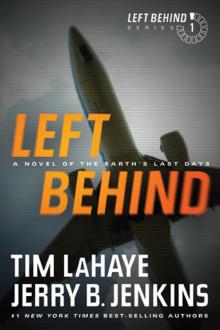 Left Behind: A Novel of the Earth's Last Days
Left Behind: A Novel of the Earth's Last Days Kingdom Come: The Final Victory
Kingdom Come: The Final Victory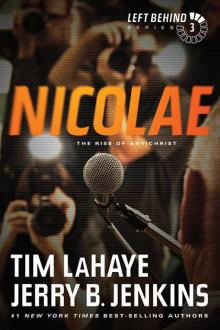 Nicolae: The Rise of Antichrist
Nicolae: The Rise of Antichrist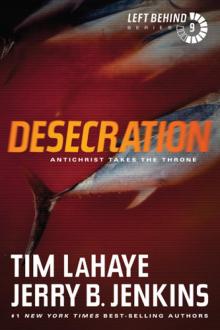 Desecration: Antichrist Takes the Throne
Desecration: Antichrist Takes the Throne Mark's Story: The Gospel According to Peter
Mark's Story: The Gospel According to Peter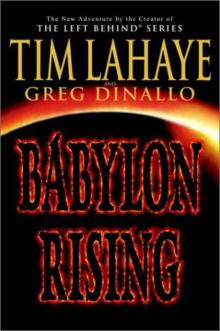 Babylon Rising
Babylon Rising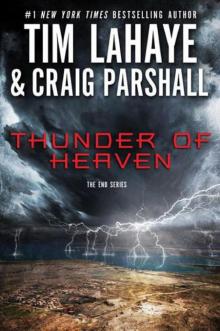 Thunder of Heaven: A Joshua Jordan Novel
Thunder of Heaven: A Joshua Jordan Novel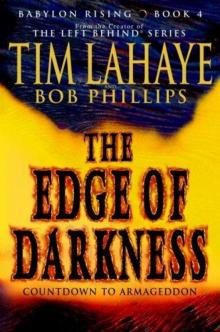 The Edge of Darkness
The Edge of Darkness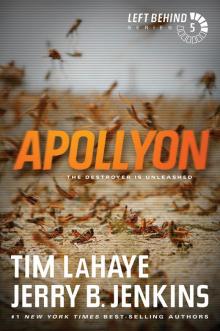 Apollyon: The Destroyer Is Unleashed
Apollyon: The Destroyer Is Unleashed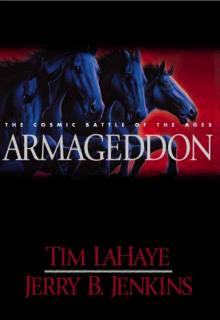 Armageddon: The Cosmic Battle of the Ages
Armageddon: The Cosmic Battle of the Ages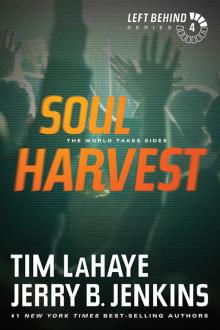 Soul Harvest: The World Takes Sides
Soul Harvest: The World Takes Sides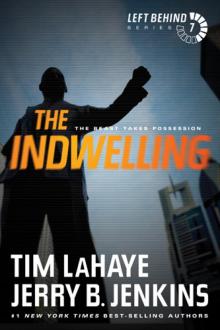 The Indwelling: The Beast Takes Possession
The Indwelling: The Beast Takes Possession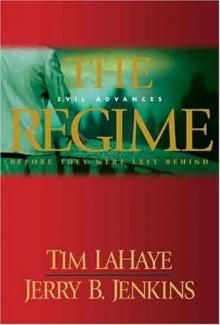 The Regime: Evil Advances
The Regime: Evil Advances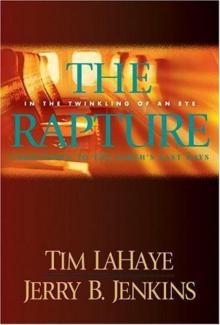 The Rapture: In the Twinkling of an Eye / Countdown to the Earth's Last Days
The Rapture: In the Twinkling of an Eye / Countdown to the Earth's Last Days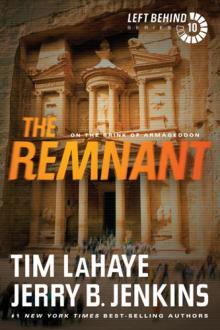 The Remnant: On the Brink of Armageddon
The Remnant: On the Brink of Armageddon John's Story: The Last Eyewitness
John's Story: The Last Eyewitness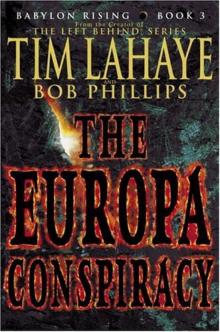 The Europa Conspiracy
The Europa Conspiracy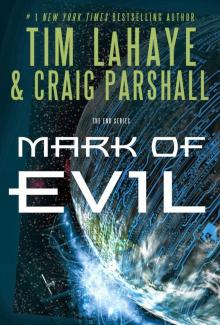 Mark of Evil
Mark of Evil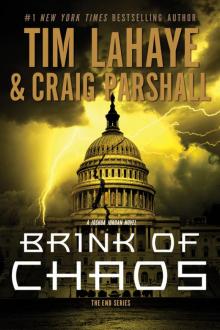 Brink of Chaos
Brink of Chaos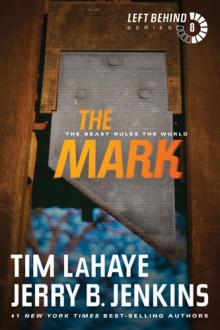 The Mark: The Beast Rules the World
The Mark: The Beast Rules the World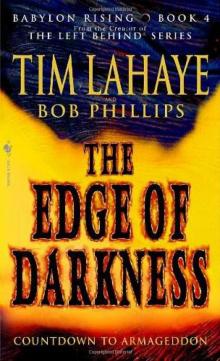 04 The Edge of Darkness
04 The Edge of Darkness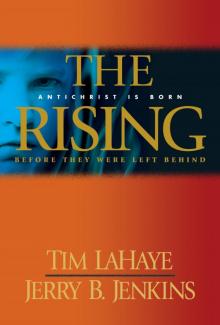 The Rising: Antichrist is Born / Before They Were Left Behind
The Rising: Antichrist is Born / Before They Were Left Behind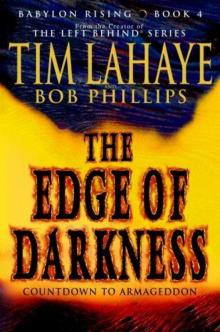 Babylon Rising: The Edge of Darkness
Babylon Rising: The Edge of Darkness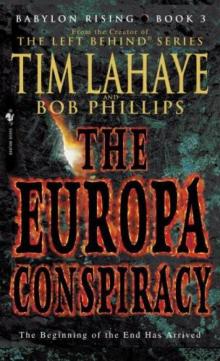 03 The Europa Conspiracy
03 The Europa Conspiracy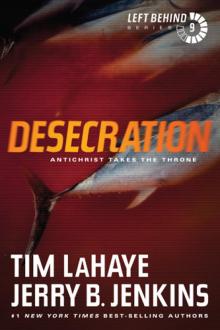 Desecration
Desecration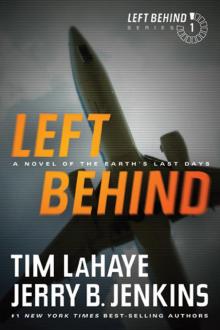 Left Behind
Left Behind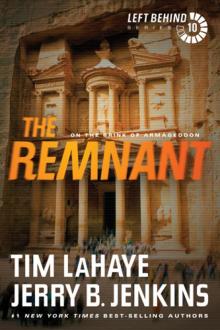 The Remnant
The Remnant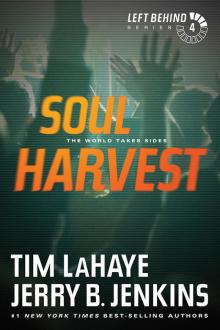 Soul Harvest
Soul Harvest Left Behind Book 13: Kingdom Come The Final Victory
Left Behind Book 13: Kingdom Come The Final Victory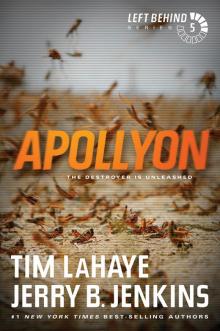 Apollyon
Apollyon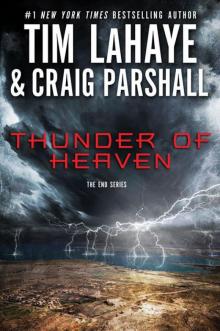 02 Thunder of Heaven: A Joshua Jordan Novel
02 Thunder of Heaven: A Joshua Jordan Novel Glorious Appearing
Glorious Appearing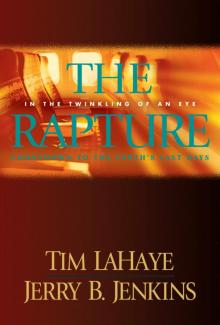 The Rapture: Evil Advances / Before They Were Left Behind
The Rapture: Evil Advances / Before They Were Left Behind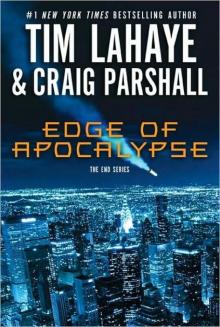 Edge of Apocalypse
Edge of Apocalypse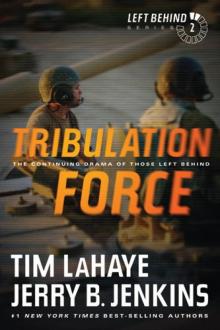 Tribulation Force
Tribulation Force The Left Behind Collection: All 12 Books
The Left Behind Collection: All 12 Books Black Friday
Black Friday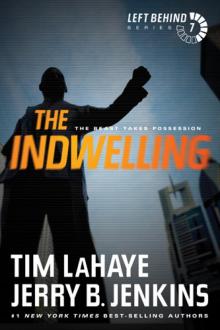 The Indwelling
The Indwelling The Left Behind Collection
The Left Behind Collection